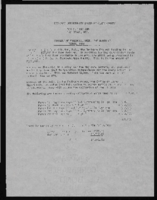Search the Special Collections and Archives Portal
Search Results

Economic Opportunity Board of Clark County (Nev.) financial and budget reports
Date
Archival Collection
Description
From the Clark County Economic Opportunity Board Records -- Series I. Administrative. This folder contains financial memos and reports of the Clark County Economic Opportunity Board in 1966.
Text

Transcript of interview with Rachel Gibson by Kay Long & Caryll Batt Dziedziak, August 25, 1998
Date
Archival Collection
Description
Rachel Gibson was the granddaughter of Nevada pioneers. Her maternal grandparents, George Rammelkamp and Anna Dougherty, were among the earliest white residents of northern Nevada, settling first in Dayton and later Yerington. Her mother, Clara Angelina, and her two aunts, Elizabeth and Georgie, graduated from the University of Nevada at the turn of the century. Clara taught in Yerington for a number of years before marrying Chase Masterson, a dentist. Rachel was born in 1913 in Yerington. The eldest of three children, she continued the tradition of women’s learning and education that began with her mother’s generation. Her 1930 class was the first to graduate from Las Vegas High School, and soon after Rachel moved to California to attend college. Although her father had counseled her to study law, Rachel chose the field of economics. She received her Bachelor’s degree from the University of California at Berkeley, and worked in San Francisco for one year before returning to complete
Text

Transcript of interview with Renee Marchant Rampton by Dr. Caryll Batt Dziedziak, September 25, 2015
Date
Archival Collection
Description
Renee Marchant Rampton has often referred to herself as "One of Fifteen." Indeed, growing up in a family of fifteen children, Renee experienced the care of loving parents, the excitement of a bustling household, and the engagement of an active Church; all amidst the strains of a depression era economy. Renee's mother, Beatrice Marchant, provided Renee with a strong role model with which to emulate; a disciplined woman, who rose to the task without hesitation. Beatrice became the family's provider after her husband's debilitating stroke and later served in the Utah Legislature during the 1970s. Renee loved music from an early age. As a young child she found an early job as a piano accompanist for a dance studio. In 1956 she married musician, Roger Rampton, a successful percussionist. They soon settled in Las Vegas, where Roger performed on the Strip and they began raising their four children. It was an exciting period in Las Vegas history as the Strip attracted musicians and
Text

Transcript of interview with Sam Earl by Laura Button, March 9, 1981
Date
Archival Collection
Description
On March 9, 1981, Laura Button interviewed Sam Earl (born 1912 in Virgin, Utah) about his life in Nevada. Also present during the interview is Sam’s wife, Melissa Earl. The three discuss a wide range of topics from the early development of Las Vegas, Sam’s work on the Boulder Dam, the Earls’ early residence in a tent, and the family’s religious participation. The interview also covers gambling, Block 16, the first members of the police force, recreational activities, and the Helldorado parade. Sam also talks about his work as a building contractor, including some of the buildings and casino properties he helped build, and the interview moves to a discussion of the development of the Las Vegas Strip. The interview concludes with Sam’s description of his work as a truck driver and a discussion on welfare benefits.
Text

Transcript of interview with Myoung-ja Lee Kwon by Claytee White, September 4, 2004
Date
Archival Collection
Description
Myoung-ja Lee Kwon began her life on the grounds of the Kyongbok Palace in Korea. In a country where education is valued, her father's occupation as a university professor meant that the family was highly honored, thus this palatial space allowed them live in a state of prosperity. But war changed these circumstances and in this interview Kwon vividly explains the family's evolution. In 1965, after graduation from Seoul National University she married and a year later, moved to the United State of America where she earned a Master's degree in Library Science in Provo, Utah. Her first professional position was at the University of Nevada Las Vegas as a cataloguer and after many promotions, became interim dean of UNLV Libraries. In 2001, she took the job as Dean of Libraries at California State East Bay Library, retiring in 2008. Currently, she serves as a special lecturer and discussion leader with the Fulbright Senior Specialist Program. During her 2009 visit to Korea, she pr
Text

Transcript of interview with Joyce Moore by Claytee D. White, January 22, 2013
Date
Archival Collection
Description
Joyce Moore's family moved to Las Vegas from Chicago in 1953, when she was eight years old. She attended Rancho High School, married and had three daughters, and currently lives in Las Vegas. Joyce's father was in the gaming industry and her mother was a nurse. Growing up in Las Vegas meant going to shows with her mother, spending summer days in the pool at the Showboat Hotel, and riding horses to the Last Frontier. While a teenager at Rancho High school, Joyce worked at several movie theaters including the Huntridge, went to school dances and marched in the Hellodorado Parade. After her divorce, Joyce returned to work to support herself and her children, first at the Daily Fax then later on the Strip at the Aladdin and Circus, Circus doing a variety of office and accounting jobs. As a lark she and a friend applied to work as cocktail waitresses at the MGM; she was hired and spent the next five years in a job that was by turns interesting, exhausting, frustrating and fun. This interview covers several periods of Joyce's life - her childhood, teen years, and early adult life - and what it was like to grow up, live and work in Las Vegas in from the mid-1950s until the mid-1970s.
Text

Transcript of interview with Sonja Saltman by Barbara Tabach, August 18, 2015
Date
Archival Collection
Description
Included in this oral history are reminiscences of Sonja Saltman's personal non-Jewish heritage in Austria, the importance of her grandmother in her life, and how she recalls becoming part of the Jewish community.
Sonja Saltman is a psychologist and philanthropist in Las Vegas, Nevada. She is executive director and co-founder of the Existential Humanistic Institute, a non-profit organization based in San Francisco, California that offers training in existential-humanistic therapy and theory. In 2003 Sonja and her husband Michael Saltman founded the Saltman Center for Conflict Resolution at the University of Nevada, Las Vegas (UNLV) William S. Boyd School of Law. The Saltman Center is focused on research, teaching, and public service related to "the advanced study of the nature of conflict and how to resolve it." A native of Austria, Sonja Saltman also serves as the Honorary Consul for Austria in Las Vegas. The Saltmans are involved with multiple charitable organizations and initiatives, both locally and abroad. Sonja Saltman has served on the boards of the Anti-Defamation League, Nevada Women's Philanthropy, and the Black Mountain Institute. Projects that the couple has supported include the rebuilding of homes and bridges is Bosnia, and Streetball Hafla, a basketball program to improve relations between Jewish and Arab teenagers in Israel. In 2014 Sonja and Michael Saltman were recognized as Distinguished Nevadans by the Nevada System of Higher Education. Included in this oral history are reminiscences of her personal non-Jewish heritage in Austrian, the importance of her grandmother in her life, and how she recalls becoming part of the Jewish community.
Text

Transcript of interview with David Dahan by Barbara Tabach, May 26, 2016
Date
Archival Collection
Description
The fascinating life of David Dahan began in Casablanca, Morocco where he was born to Mathilde and Isaac Dahan in 1957. After a hasty departure in 1970 the family came to America and to Las Vegas. Isaac became an administrator for Yellow Cab and Mathilde was a server at the Stardust Hotel/Casino. David evokes a tale of growing up a teenager in a strange culture and then heading out on a solo adventure to learn about the world. By 1977, he fell in love and married an engaging Israeli nurse named Yaffa (1954-2007). Her legacy is the Yaffa Dahan Nursing Education Fund established to assist outstanding PhD nursing students in their dissertation research. Leadership and the energy to always say yes are among David?s many characteristics. He has served on numerous local boards, such as: Nevada Restaurant Association, North Vista Hospital, Touro University, Las Ventanas, Henderson Chamber of Commerce, and the Nevada Law Foundation. He has been the recipient of many awards and acknowledgments for his tireless efforts throughout Las Vegas. Among those is being named the 2005 Person of Influence by In Business Las Vegas. From 1997 ? 1999, he served as President of the Jewish Federation during which time he led a trip to Russia. He is past chair of AIPAC (American Israel Public Affairs) Committee. In 2007, David was honored as Mensch of the Year at Congregation Ner Tamid. In this interview he recalls his family?s escape from Morocco, learning to adjust to life in Las Vegas and his early jobs in the restaurant business. With his roots firmly planted in Las Vegas, David has built strong relationships within the Jewish and general Las Vegas communities. David is the Chief Executive Officer of Orgill/Singer Insurance. His life experiences have fueled passions for his faith, cooking, photography, poetry and his daughters, Shana and Michelle.
Text

Al McDaniels interview, February 28, 1980: transcript
Date
Archival Collection
Description
On February 28, 1980, Rodney Goosby interviewed Al McDaniels (b. 1940 in Muskogee, Oklahoma) about his life in Las Vegas and his career as an athletic coach. McDaniels, referred to as Coach by Goosby, speaks primarily about his time as a coach for track and field at the University of Nevada, Las Vegas, his community involvement and the city’s recreational activities. Moreover, McDaniels speaks about his education and his current research as he works on a doctoral degree in physical education. Lastly, he talks about the city’s growth and the move from empty desert spaces to housing and shopping center constructions.
Text

Untitled unpublished manuscript by Roosevelt Fitzgerald
Date
Archival Collection
Description
From the Roosevelt Fitzgerald Professional Papers (MS-01082) -- Unpublished manuscripts file. "Injustice Blacks Have Suffered…" ending with Naomi Long Madgett's poem "Midway."
Text
